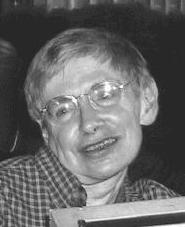Department of Applied Mathematics and Theoretical Physics,
Cambridge University, UK
Science in the Future
"This evening I want to look with you into the future, to see how our understanding of the world and our technology might develop in the future." Starting with Star Trek and moving on to topics as diverse as World population, particle physics and alien invasion, Professor Hawking describes not only the advances in science, but also the scenarios on earth that we may have to be prepared for in the future. Starting with the ideas of Galileo and Aristotle we see how things have changed beyond recognition in a few centuries. Will 'The Simpsons' reveal what's to come?

Born on 8 January 1942 in Oxford, England, Professor Hawking took an Honours degree in Natural Science with Physics at Oxford, and went on to earn his Doctorate in Cosmology at Cambridge. Since 1979 he has been Lucasian Professor of Mathematics, a chair previously held by Isaac Newton and Paul Dirac, at the Department of Applied Mathematics and Theoretical Physics in Cambridge. Living with a serious disability due to motor neuron disease, he has achieved more than most ordinary people, led a full academic and family life, and been a great source of inspiration.
Professor Hawking is visiting India as Sarojini Damodaran International Fellow of the Tata Institute of Fundamental Research. He is an invited speaker at the international conference "Strings 2001" and will deliver Public Lectures in Mumbai and Delhi, organized in association with The British Council.
The fundamental properties of space and time have been the major focus of Professor Hawking's work. In one of his seminal papers, he showed that, when the effects of quantum theory are taken into account, a black hole is not really black, but emits a steady stream of particles. This work has proved to be a landmark in contemporary theoretical physics. The connection that he developed between the geometry of black holes and thermodynamics raised foundational questions about the two established pillars of 20th century physics: General Relativity and Quantum Mechanics. His work has important implications for our understanding of the origin and fate of the universe.
His hopes for the attainment of a fundamental theory of nature, and its relevance to the general public, are best summed up in the concluding paragraph of his famous book: "... if we do discover a complete theory, it should in time be understandable in broad principle by everyone, not just a few scientists. Then we shall all, philosophers, scientists and just ordinary people, be able to take part in the discussion of the question of why it is that we and the universe exist. If we find the answer to that, it would be the ultimate triumph of human reason, for then we would know the mind of God".